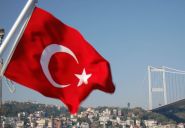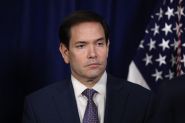- Home
- Middle East
- Syria's New Leaders Pledge Justice and Inclusivity After Assad's Fall

This handout image made available by the Telegram channel of the official Syrian Arab News Agency (SANA) shows Syria's new transitional prime minister Mohammad al-Bashir chairing a meeting of the new cabinet in Damascus on December 10, 2024 ©STRINGER / SANA / AFP
Syria's new prime minister said the Islamist-led alliance that ousted president Bashar al-Assad will guarantee the rights of all religious groups and called on the millions who fled the war to return home.
Assad fled Syria after a lightning offensive spearheaded by the Islamist Hayat Tahrir al-Sham (HTS) group and its allies, which brought to a spectacular end five decades of brutal rule by his clan.
Syrians across the country and around the world erupted in celebration, after enduring a stifling era during which anyone suspected of dissent could be thrown into jail or killed.
With Assad's overthrow plunging Syria into the unknown, its new rulers have sought to assure members of the country's religious minorities that they will not repress them.
They have also pledged justice for the victims of Assad's iron-fisted rule, with HTS leader Abu Mohammed al-Jolani vowing on Wednesday that officials involved in torturing detainees will not be pardoned.
Half a million people have been detained since the start of the war, with about 100,000 dying either under torture or due to poor detention conditions, according to the Syrian Observatory for Human Rights war monitor.
"We will not pardon those involved in torturing detainees," said Jolani, now using his real name Ahmed al-Sharaa, urging "countries to hand over any of those criminals who may have fled so they can be brought to justice".
In the corridors of Damascus's main hospitals, thousands of families gathered to try to find the bodies of loved ones captured years ago by the authorities.
'Starting to feel safe'
Sunni Muslim HTS is rooted in Syria's branch of Al-Qaeda and is proscribed as a terrorist organisation by many Western governments, though it has sought to moderate its rhetoric.
"Precisely because we are Islamic, we will guarantee the rights of all people and all sects in Syria," said Mohammad al-Bashir, whom the rebels appointed as the transitional head of government.
Asked whether Syria's new constitution would be Islamic, he told Italian daily Corriere della Sera that "we will clarify all these details during the constituent process".
Bashir, whose appointment was announced Tuesday, is tasked with heading the multi-ethnic, multi-confessional country until March 1.
After decades of rule by the Assads, members of the minority Alawite offshoot of Shiite Islam, Syrians now face the enormous challenge of charting a new course as they emerge from nearly 14 years of war.
In Aleppo, Syria's second city and the first major one captured by the rebels in their offensive, shopkeeper Ramadan Dali, 70, said that "we are starting to feel safe."
'Smooth transition'
The United Nations' envoy for Syria, Geir Pedersen, urged an inclusive process, telling AFP that his "biggest concern is that the transition will create new contradictions in the manner that could lead to new civil strife".
UN Secretary-General Antonio Guterres said the world body was "totally committed to supporting a smooth transition of power".
Assad was propped up by Russia, where he reportedly fled, as well as Iran and Hezbollah.
On Wednesday, the Kremlin said it wanted to see stabilisation in Syria "soon", as it criticised Israel over hundreds of air strikes it conducted on its neighbour over the past two days.
Maher Ai Mounes and Aya Iskandarani, with AFP
Read more



Comments